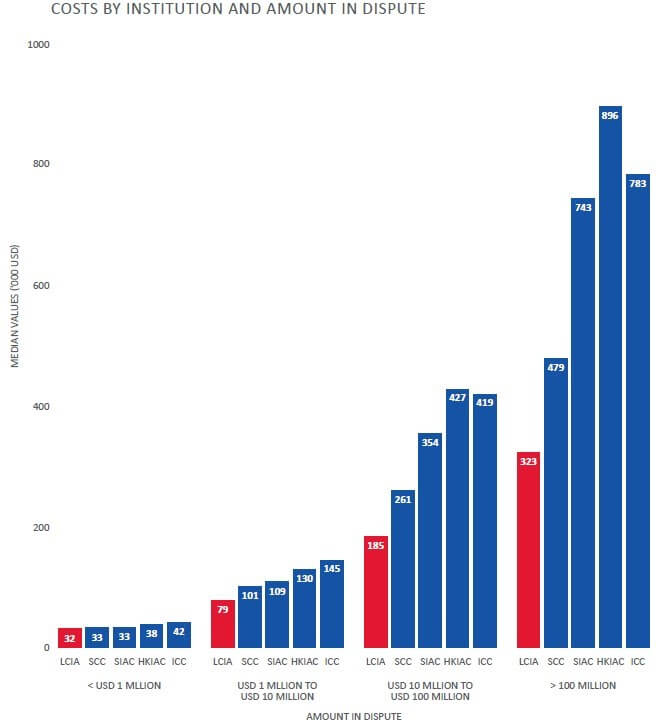When initiating a SIAC arbitration, some of the basic questions most claimants ask are how much a SIAC arbitration costs, when payments are due and whether the costs can be recovered from the opposing party.
What Are the Heads of Costs in a SIAC Arbitration?
The costs of an arbitration are usually divided into four main groups: (i) fees and costs of the arbitral tribunal and the arbitration centre, (ii) legal fees and costs of the lawyers, (iii) fees and costs of experts and (iv) party costs related to internal expenses of the parties, including the costs of the hearing venue and the expenses of witnesses.
The SIAC Arbitration Rules define the “costs of the arbitration” as limited to (a) the Tribunal’s fees and expenses, (b) SIAC’s administration fees and expenses and (c) the costs of any expert appointed by the Tribunal and of any other assistance reasonably required by the Tribunal (Rule 35). To these costs should be added the party’s legal and other costs (Rule 37).
What Are SIAC Arbitration Costs at the Beginning of Proceedings?
The party who initiates an arbitration under the SIAC Arbitration Rules must file a Notice of Arbitration together with “payment of the requisite filing fee” (Rule 3.1 of the SIAC Arbitration Rules). The filing fee is SGD 2,000 (approximately USD 1,500) for non-Singaporean parties and SGD 2,140 if the claimant is from Singapore (SIAC Schedule of Fees). This case filing fee is non-refundable.
This initial payment is followed soon after by a deposit for the arbitral tribunal’s fees and SIAC’s fees. Both parties are requested pay 50% of the deposit. However, the SIAC Registrar has the power to fix separate deposits on costs for claims and counterclaims, respectively (Rule 34.2), which is useful when claims have a very different value.
Can SIAC Arbitration Costs Be Paid by Third-Party Funders?
The SIAC Arbitration Rules do not make reference to the possibility of a party to cover arbitration costs by using third-party funding. However, on 31 March 2017, SIAC issued a Practice Note on Arbitrator Conduct in Cases Involving External Funding, which provides that the arbitral tribunal may take into account the existence or the involvement of a third-party funder when deciding on the costs of the arbitration.
- The Tribunal may take into account the existence of any External Funder in apportioning the costs of the arbitration.
- The Tribunal may take into account the involvement of an External Funder in ordering in its award that all or a part of the legal or other costs of a Disputant Party be paid by another Disputant Party.
The SIAC Investment Arbitration Rules (effective as of 1 January 2017) expressly grant an arbitral tribunal the power to order disclosure of the existence of a funding arrangement entered into by one of the parties to the proceedings, the identity of the third-party funder involved and further details on the third-party funder’s involvement and interest in the outcome of the case.
How Much Does It Cost to Have an Arbitration Administered by SIAC?
SIAC administrative fees are calculated based on the amount in dispute in accordance with the Administrative Fees Schedule. For example, for an arbitration with an amount in dispute of USD 1,000,000, administrative fees will be approximately USD 12,500.
The biggest share of all costs related to arbitration tends to consist of lawyers’ legal fees.
An LCIA study of arbitration costs estimates that SIAC arbitrations cost less that ICC or HKIAC arbitrations, but more than an LCIA or SCC arbitration.

Can SIAC Arbitration Costs be Recovered by the Successful Party?
The parties may agree on how the arbitration costs should be apportioned, however, in practice this rarely occurs. In the absence of an agreement between the parties, the arbitral tribunal determines in the Award the apportionment of the costs of the arbitration among the parties (Rule 35.1).
Rule 37 specifies that the arbitration tribunal has the authority to order that all or a part of the legal or other costs of a party be paid by another party. The SIAC arbitration rules are silent as to how arbitration costs should be allocated, however. In the absence of a rule on allocation, commonly it is considered that the law of the seat of arbitration applies to the arbitral tribunal’s award of costs (ICC Cost Report).